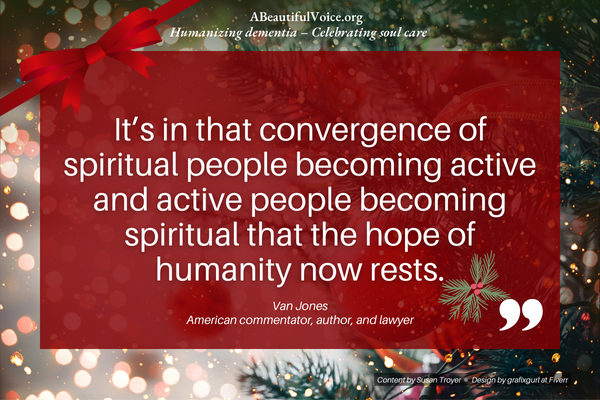We can acquire this knowledge, and it can lead us to greater sensitivity to others and to the environment surrounding us. From: What does it mean to be spiritual? by Galen Watts, PhD
Study reveals characteristics of spirituality
In his research, Galen Watts, PhD, has identified an association between spirituality and the ethical ideals of compassion, empathy, and open-heartedness.
He finds that these characteristics flow naturally out of the introspection inherent with spirituality. He believes attention to one’s “path inward” when based upon ethicality may be rooted in a search for better understanding of the human condition. These ideals, he states, ultimately require a high level of self-knowledge and self-understanding.
The study reveals the importance of tuning in to the realm of spirituality in our lives. But where does one begin? Here are the findings of the author:
This knowledge — acquired either through practices like meditation, self-reflection and (in some cases) psychotherapy — leads one to become more sensitive to the emotions of others, and even to one’s surrounding environments, both social and natural. – Galen Watts, PhD, Author
Not only can we acquire this knowledge, but it can enhance a greater sensitivity to others and to our environment. Currently, the author’s research extends to lived spirituality and how it is experienced in our day-to-day lives.
Findings answer these key questions
Does possessing these traits mean that one is necessarily spiritual? What is the difference between being spiritual and being religious? Do all millennials who call themselves spiritual live these ethical ideals? Find answers to these questions – and more…! Click link to read article: What does it mean to be spiritual?
Observing significant trends in our culture
What significant trends related to spirituality has the author identified among North Americans? What additional trends are emerging with the millennials?
You’re invited to read his full article here.
We look forward to following Dr. Watts in his research!
__________
Reflections from the website author:
In our on-going search for ways to “celebrate soul care,” we will continue in 2024 to focus a beam of light onto this topic, “Spirituality and its implications for dementia care.”
As a dementia advocate, I believe that the three characteristics identified by Dr. Watts as having an association with spirituality can be learned and cultivated.
We need to break the numbing silence in our culture of “Why bother?” which surrounds people living with dementia. In pursuit of more fully “celebrating soul care,” these questions will be included in our search:
- How does spiritual-based care affect the well-being of the older loved one in dementia care?
- How can these characteristics and ethical ideals associated with being spiritual most effectively be infused into the healthcare environment? And specifically, into dementia care?
- What is the best preparation for being teachable?
As an advocate, I believe we begin with awareness, attunement, and education. This site will continue to focus collective energies and passion in that direction in the coming year.
Please stay in touch. Stay with us. There’s more.
__________
 Author: What does it mean to be spiritual? Galen Watts, PhD, is an Assistant Professor in the Department of Sociology and Legal Studies at the University of Waterloo in Waterloo, Ontario. He is a cultural sociologist interested in religion, work, and politics in contemporary societies. The article, What does it mean to be spiritual? is republished from TheConversation.com and is shared here under a Creative Commons license. Read the original article.
Author: What does it mean to be spiritual? Galen Watts, PhD, is an Assistant Professor in the Department of Sociology and Legal Studies at the University of Waterloo in Waterloo, Ontario. He is a cultural sociologist interested in religion, work, and politics in contemporary societies. The article, What does it mean to be spiritual? is republished from TheConversation.com and is shared here under a Creative Commons license. Read the original article.
 Author featured meme: Van Jones, the American commentator and author of the quote in the featured meme, states that looking inward may cause society to act more wisely. He believes that at this critical point in history, it’s in the convergence of becoming spiritual – and active – where the hope of humanity now rests. Credits: Van Jones Image by: Senate Democrats CC BY 2.0, via Wikimedia Commons
Author featured meme: Van Jones, the American commentator and author of the quote in the featured meme, states that looking inward may cause society to act more wisely. He believes that at this critical point in history, it’s in the convergence of becoming spiritual – and active – where the hope of humanity now rests. Credits: Van Jones Image by: Senate Democrats CC BY 2.0, via Wikimedia Commons

Blog author: Spirituality and its implications for dementia care – Susan Troyer, MS, BA.
Member:



Leave A Comment